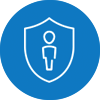Call or Text
(801) 223-8188
Mon – Fri: 8:00 am – 6:00 pm
Sat: 9:00 am – 2:00 pm
Submit a Question to our Support Team
or send us a message from inside online banking.

Each account you have should be protected by a unique password, the longer the better. An easy way to ensure that your passwords are safe, secure, and manageable is by using a password manager. Password managers can generate unique and complex passwords for all your accounts.
Most operating systems and smartphone applications alert you when updates are available. Some devices, such as network routers, require you to manually check for updates to firmware.
Older devices will fall into a no-longer-supported category, which means security patches or updates will no longer be available and the device should be replaced with a newer one. Check with your device manufacturer for more details.
If you are running the default anti-virus software that came with your operating system, it should update as you update as your OS updates. If you are running a third-party anti-virus, then it is a good idea to make sure that it is updated at regular intervals, like once a week
Login to your accounts frequently to monitor your transaction detail. If you have transaction accounts at different institutions, you can use UCCU’s 360-View Financial Aggregation to monitor and manage all your accounts with a single login.
Monitoring services watch for signs that an identity thief may be using your personal information. For example, identity monitoring services may alert you when your personal information shows up in:
Elevated Checking accounts at UCCU include the following added securities below:
Most of us are so happy to find WiFi when we’re out and about that we click past the “Terms and Conditions” without giving them much thought. But here’s something that should give us all pause: personal information that is sent or received through wireless networks is susceptible to interception.
Be very careful when using any WiFi and always avoid sending any personal information over any network you do not control, especially open networks.
If you don’t know who the email is from, don’t open a hyperlink or attachment. And remember, no reputable organization is going to contact you and ask you for your personal information – even if it looks like it’s from UCCU or another financial institution.
Every UCCU member has the option to set up a code word for added security. By default, this is enabled if you call UCCU. You can have your code word flagged to be able to use in person at a branch.
A credit freeze will prevent potential lenders from accessing your credit report (often for a price), stopping a thief from opening an account or getting credit, even if they have your personal information.
It’s one of the oldest scams in the book because it works. Every year, people send money to fraudsters for all kinds of reasons. It’s easy to believe it won’t happen to you and yet, millions of dollars are continuously lost to unsuspecting victims, simply because they believed they were doing the right thing by sending money to the wrong people.
So just don’t do it. Never wire money to a stranger, even when that stranger claims to be acting in your best interests and especially when they use any type of scare tactics to get you to pay up right now.
Social engineering is the act of getting you to provide sensitive information to malicious actors. We have historically seen this in emails, known as phishing. In the last few years vishing, where someone calls pretending to be from a reputable agency, company, or organization, has seen a lot of usage because it also works. Most recently we have seen social engineering in the form of texting, known as smshing.
The fact is, no reputable agency, company, or organization is going to contact you to request or demand your sensitive information (such as credit card or social security numbers). If you receive a call and you’re not sure if it’s legitimate, simply hang up and call the agency, company, or organization back directly… after looking up and confirming the correct number on your own.
When shopping online, it’s always best to stick with retailers and websites you know and trust. Before you shop with an unfamiliar site, do your research. Make sure it’s reputable prior to providing personal information.
If you believe you are an identity theft victim or are at risk of becoming one, you can place a fraud alert on your credit report, alerting potential lenders to verify the identity of anyone attempting to open an account in your name.
Account security alerts are free and designed to notify you when security related activity or changes occur on your account. There are 19 different security alerts that can be enabled inside online banking (many of which are enabled by default.) Members should ensure their security alert delivery preferences (e.g. text, email) are up-to-date.
Palm scanners detect vein patterns using near-infrared light to identify you. Members can enable palm scanner security at any branch.
(801) 223-8188
Mon – Fri: 8:00 am – 6:00 pm
Sat: 9:00 am – 2:00 pm
or send us a message from inside online banking.



